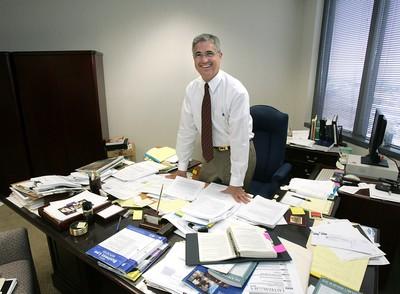Lawyer finds way from gaming commission back to land of litigation

When Gov. Bob Miller asked longtime friend Bill Urga to serve on the five-member Nevada Gaming Commission in 1991, the Las Vegas attorney happily accepted.
Urga’s knowledge of the commission, however, was somewhat skewed.
At the time, he had done little in the way of gaming law. Even today, as the senior partner in the law firm of Jolley, Urga, Wirth, Woodbury and Standish, Urga continues to spend most of his time on litigation matters.
He could count on one hand the number of appearances he made in front of the gaming commission for clients. His most memorable moment came while sitting in the audience in 1978 waiting for a client’s matter to be called. Urga watched the now infamous confrontation between then gaming commission Chairman Harry Reid and reputed mob associate and future List of Excluded Persons’ member Frank "Lefty" Rosenthal unfold. The moment was depicted in the movie "Casino."
After accepting the appointment from Miller, Urga attended the March 1991 gaming commission meeting. That hearing included an item involving Japanese businessman Masao Nangaku’s troubled ownership of the now-demolished Dunes. The hearing began at 9 a.m. and lasted until midnight.
"I really began to wonder what I got myself into," Urga recalled. "Gov. Miller asked me to serve and I considered it at honor."
Urga filled out two years of an unexpired term and was then appointed to a full four-year term in 1993. During his time on the commission, Urga voted to approve the move by several gaming companies to go public through the stock market.
He also was one of five votes to license the openings of several Strip resorts, including the MGM Grand.
"The gaming companies were really starting to expand," Urga said. "It was an interesting time."
Urga left the commission at the end of his appointment in 1997, but he didn’t stray far from gaming. He serves on the compliance committees of three casino operators — MGM Mirage, Ameristar Casinos and Black Gaming.
Urga chairs the three-member MGM Mirage compliance committee, serving with Richard Morgan, former dean of the Boyd School of Law, and Ellen Knowlton, retired head of the Las Vegas office of the FBI. The MGM Mirage compliance committee is considered groundbreaking by regulators because it is autonomous from the gaming company.
Question: Since you weren’t a full-time gaming attorney when you joined the commission, how did you get up to speed?
Answer: I’m a quick study and I spent a lot of time reading the statutes and regulations. It’s a learning process and you get thrown in rather quickly. I had a firm policy; I read everything because I didn’t want attorneys to bring up things that weren’t in the record.
Question: What was the most controversial matter you handled as a member of the commission?
Answer: The chairman, Bill Curran, had to recuse himself from the Ted Binion matter (the Binion’s casino heir whose death in 1998 sparked one of Las Vegas’ most publicized murder trials). I served as the acting chair. We put restrictions on Ted’s license, including both regular and random drug testing. We gave him another year to try to clean himself up and he got near the end but fell off the wagon again.
Question: Did you want to ever serve a chairman of the gaming commission?
Answer: If I had been asked, I would have, but when my last term was up, I needed to get back to practicing law. I was spending as much as 80 hours a month on the gaming commission (designated a part-time position by state statues). My being on the commission stopped us from taking some personal injury actions against some of the casinos and that type of thing.
Question: How did you end up on the different casino company compliance committees?
Answer: The companies came to me and asked me to join. Normally, former regulators are asked because everyone is required to have an independent member who is knowledgeable in gaming.
Question: What is the role of a compliance committee?
Answer: The compliance committees give regulators a second set of eyes. With the companies going all over the world, it’s important they don’t violate gaming laws in whatever jurisdiction they are operating. The compliance committee can also go beyond gaming. We want to make sure they don’t violate other laws. We watch and help a company try to avoid issues that could come up. If something happens that is a violation, we can help correct it and make sure it is being corrected.
Question: How is the MGM Mirage compliance committee different from others in the industry?
Answer: MGM is keeping the committee totally independent from the company. Other company compliance committees have internal people on the committee.
We don’t. We also rotate the chairmanship on an annual basis. We hired a vice president of compliance who is an employee of MGM but reports directly to us.
Both the control board and the gaming commission agreed with what MGM was doing.
It’s brand new and different because MGM Mirage has 70,000 employees, 10 casinos and joint ventures where they are going into new areas for gaming and nongaming. We think the approach in how MGM Mirage is looking at compliance is cutting edge.
Question: Has the emergence of out-of-state law firms been a challenge?
Answer: Years ago, people would go out of state if they had bigger issues or were in need of some specialty. Today, you don’t have to go out of state because there are firms here that can handle anything. That’s one of the advantages of having regional and national firms. But the rates have gone up as a result. Attorneys are charging more and clients a paying more.
A lot of out of state firms have come into the market, but I guess that’s just a reaction to Las Vegas and Nevada as a growing area.